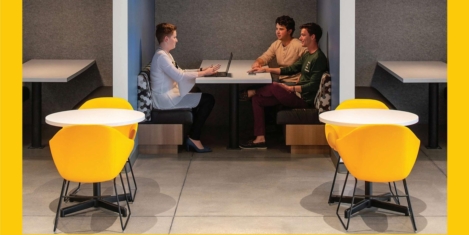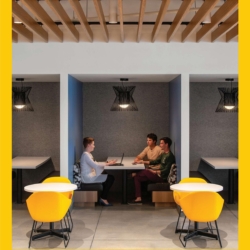August 29, 2014
New issue of Work&Place is now available to download and read online
 The September issue of Work&Place has today been published and is available to download or view online. Amongst this month’s highlights are: Ian Ellison’s review of June’s Workplace Strategy Summit; Jim Ware offers up a case study of workplace transformation at NEF from the perspective of the firm’s CEO; Agustin Chavez and Laurie Aznavoorian consider how the workplace can help firms to manage knowledge; David Karpook meanwhile characterises the role of the facilities manager as akin to that of a stage manager; Wim Pullen explores the multi-generational workplace using empirical evidence; Erik Jaspers looks at how workers are colonising the world’s cities; Pawel Lenart and Dominika Kowalska report on how one specific country – Poland – has seen a transformation in the way it creates and uses workplaces over the past twenty years; and, on related themes Nancy Sanquist explains how IFMA is driving the agenda on urban FM and Charles Marks looks at how the UK’s regions are looking to capitalise on the Smart Cities movement
The September issue of Work&Place has today been published and is available to download or view online. Amongst this month’s highlights are: Ian Ellison’s review of June’s Workplace Strategy Summit; Jim Ware offers up a case study of workplace transformation at NEF from the perspective of the firm’s CEO; Agustin Chavez and Laurie Aznavoorian consider how the workplace can help firms to manage knowledge; David Karpook meanwhile characterises the role of the facilities manager as akin to that of a stage manager; Wim Pullen explores the multi-generational workplace using empirical evidence; Erik Jaspers looks at how workers are colonising the world’s cities; Pawel Lenart and Dominika Kowalska report on how one specific country – Poland – has seen a transformation in the way it creates and uses workplaces over the past twenty years; and, on related themes Nancy Sanquist explains how IFMA is driving the agenda on urban FM and Charles Marks looks at how the UK’s regions are looking to capitalise on the Smart Cities movement












 There are plenty of definitions of the modish concept of biophilic design around right now. But perhaps nobody can top that of Erich Fromm, the sociologist and psychoanalyst who first described it in his 1973 book
There are plenty of definitions of the modish concept of biophilic design around right now. But perhaps nobody can top that of Erich Fromm, the sociologist and psychoanalyst who first described it in his 1973 book 




















September 5, 2014
Workplace design is increasingly interwoven with the dynamics of the city
by Colin Watson • Comment, Facilities management, Workplace design
More →